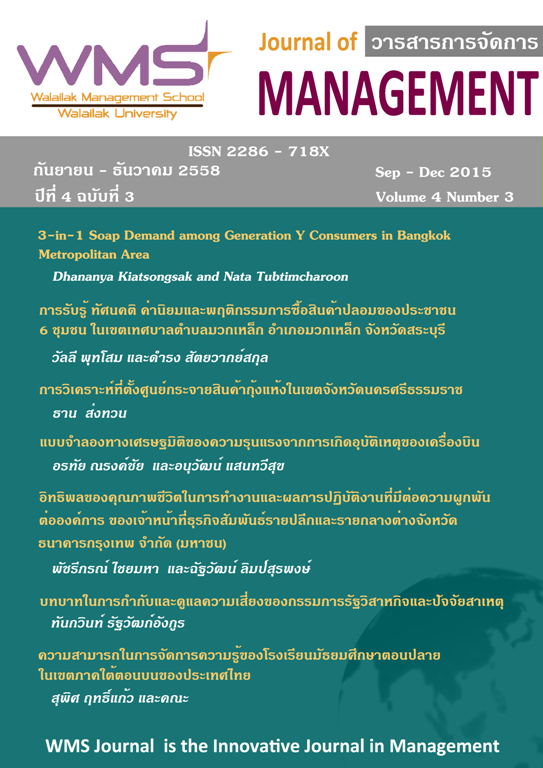Roles in Governing Risks of State Enterprise Directors and Their Antecedents
Main Article Content
Abstract
This research reports actual roles in governing risks of state enterprise directors and antecedents of their roles. Based on Grounded Theory, this study is a qualitative research, integrating In-Depth Interview, Focus Group Discussion, and Observation, through Case Study Method, conducting in a training program for 34 potential directors of state enterprises. The analysis with Triangulation Method is employed for the study.
The study finds that the directors present standard roles, including identifying acceptable risk scope, understanding facing risks of their organization and identifying mechanism in managing risks appropriately, and considering risks in every significant decision. Moreover, they present three additional roles: connecting between management and shareholders or original affiliation, foreseeing potential risks and warning management to prepare for risk plan, and not acting over management. For antecedents of these roles, there are five factors: business management knowledge, direct experience, network, updated information, and risk sensitivity.
Article Details
References
เทียนฉาย กีรนันทน์. 2553. ปาฐกถาในการสัมมนาใหญ่ของชมรมบริหารความเสี่ยงรัฐวิสาหกิจแห่งประเทศไทย, โรงแรมสวิสโซเทล เลอ คองคอร์ด, 6 สิงหาคม 2553.
สาคร สุขศรีวงศ์. 2554. เรียนบริหารผ่านกรณีศึกษา. พิมพ์ครั้งที่ 1. บริษัท จี.พี. ไซเบอร์พรินท์ จำกัด: กรุงเทพฯ.
สำนักงานคณะกรรมการกำกับหลักทรัพย์และตลาดหลักทรัพย์. 2553, แนวทางธรรมาภิบาลของ ก.ล.ต., ฉบับปรับปรุง ครั้งที่ 1. กรุงเทพฯ.
สำนักงานคณะกรรมการนโยบายรัฐวิสาหกิจ, กระทรวงการคลัง. 2552. แนวทางการดำเนินงานของคณะกรรมการรัฐวิสาหกิจอย่างมีประสิทธิผล. กรุงเทพฯ.
สำนักงานคณะกรรมการพัฒนาระบบราชการ. 2551. แผนยุทธศาสตร์การพัฒนาระบบราชการไทย (พ.ศ. 2551 – พ.ศ. 2555). กรุงเทพฯ.
Baldrige Performance Excellence Program. 2015. Baldrige Excellence Framework 2015-2016. Gaithersburg. MD: U.S. Department of Commerce, National Institute of Standards and Technology.
Berg, B. L., Lune, H., & Lune, H. 2004. Qualitative research methods for the social sciences (Vol. 5). Boston. MA: Pearson.
Committee of Sponsoring Organization of the Treadway Commission. 2004. Enterprise Risk Management Framework, September 2004.
Denzin, N. K. 1978. The Research Act: A Theoretical Introduction to Sociological Methods (2nd ed). New York: McGraw-Hill.
Fayol, H. 1949. General and Industrial Management. (trans. C Storrs). London: Pitman.
Glaser, B.G.& Strauss A.L. 2012. The Discovery of Grounded Theory: Strategies for Qualitative Research. Aldrine Transaction Publishers.
Louise, A, James, A & Michiel R. 2007. Learning with Cases. Ivey, Canada.
OECD (Organization of Economic Co-operation and Development). 2004. Principles of Corporate Governance. OECD, Paris.
Price Waterhouse Coopers. 2547. แนวทางการบริหารความเสี่ยง ฉบับปรับปรุง ตุลาคม 2547. Price Waterhouse Coopers: กรุงเทพฯ.
Rungwitoo, T. 2012. The Simultaneous Effect of Individual Entrepreneurial Competencies on SMEs Competitive Advantage. BAI 2012 Conference. April, 3-5, 2012. Japan.


